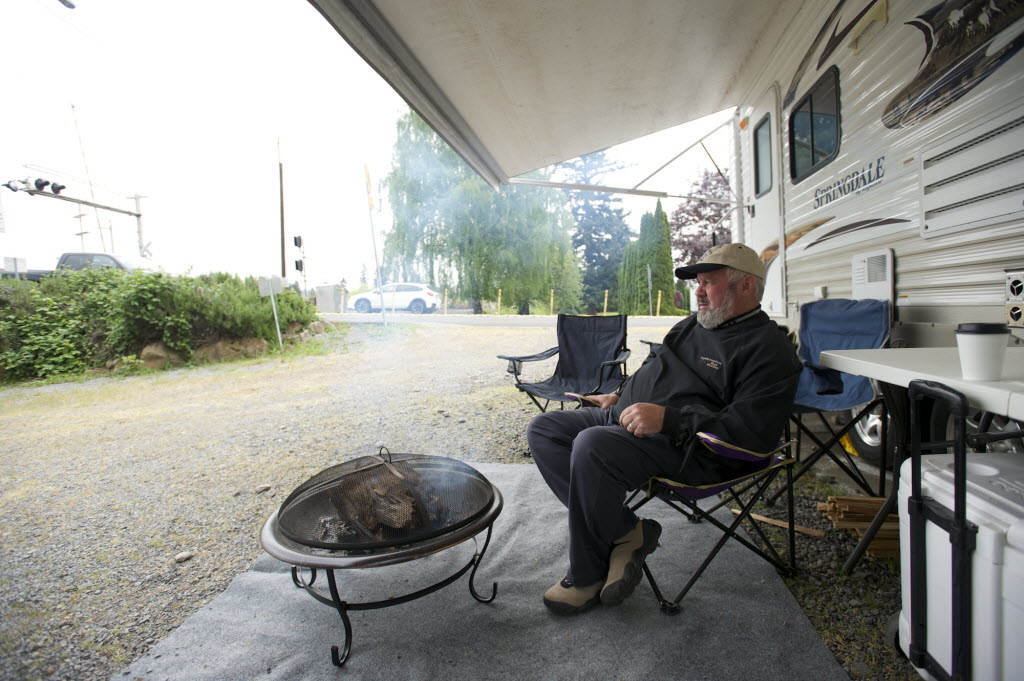Guard’s been working on the railroad all the live long week
Sean Guard wasn’t happy with how I told his story, but he got what he wanted out of it anyway: plenty of publicity.
That’s obvious, if you’ve read the comments on my April 17 article detailing Day 1 of Guard’s journey down to the railroad tracks, about 10 blocks from his house in Washougal. There, just north of the intersection of Main and 32nd streets, Guard parked his 30-foot camping trailer for a weeklong stay to watch the trains go by.
Every. Single. One. Of. Them. And he kept track of all sorts of info about each train at all times of the day, catching no more than about an hour or two of shuteye at a time.
Guard wanted a straightforward write-up to help fuel discussion about his mission: gathering as much data as he could about each passing train at the city’s busiest intersection. The types of trains, their speeds, how often they came by, the length of each traffic jam they caused, all of it. All that stuff is important, and BNSF wouldn’t share it with him, Guard said.
After the story ran, I paid Guard a visit to explain why I wrote it the way I did, starting with a little narrative about a folksy politician camping in a pretty weird spot. Oh, and of course, some of the…provisions he brought along.
It’s quirky stuff, no doubt about it.
Publicity was about half the purpose of the trip, Guard told me. The city could use an overpass at that intersection, and he wants to draw some attention to it, especially as more and more oil trains continue to pass through Washougal. And yes, he got just that from the outset when local TV news crews descended upon his campsite, like it was a fresh crime scene, leaving passersby wondering what just happened there.
Apparently, even someone from The Wall Street Journal interviewed Guard before the trip. I haven’t seen the story yet, but he posted about the interview on Facebook.
Guard says more than 300 people stopped by to chat throughout the week. No word on whether any of them dropped off a little Kentucky Fried Chicken, but Guard let his Facebook friends know he’d love some.
The list of visitors included Sen. Ann Rivers, Camas Mayor Scott Higgins, several BNSF reps and some city councilors from Washougal and Ridgefield. Rep. Liz Pike never stopped by after all.
He even created the Twitter handle @CampGuard to chronicle his stay. Guard deleted the account late Friday.
A few days into the trip, he tweeted that “railroads do not have to have an emergency response/disaster plan.” Guard thanked BNSF after someone jumped in to clarify that federal agencies do indeed require railroads to have emergency response plans.
Lots of readers also weighed in online, some praising the mayor for his dedication to the issue, and others bashing him for spending his time this way.
Guard didn’t say much Friday morning while packing up his campsite, but he considers the trip a success. He found the data he was looking for and drew attention to the issue. From what I’ve heard, he and BNSF also considered it a good learning experience for everyone.
At the end of the week, Guard was just happy to go home, as evidenced by one of his Facebook posts that afternoon.
“Hello, home. Hello, puppies! Hello big shower with lots of hot water! Hello flannel pants and sweatshirt! Hello barco lounger!”
He meant “barcalounger,” of course.

